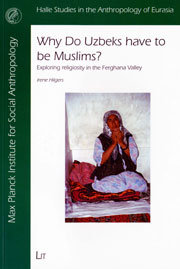Why Do Uzbeks have to be Muslims? Exploring religiosity in the Ferghana Valley

AutorIn
Irene Hilgers
Verlag
Münster: LIT
Jahr der Veröffentlichung
2009
ISBN
978-3-643-10176-1
OPAC
Abstract
In this work, Irene Hilgers analyzes the revival of Islam in postsocialist Uzbekistan, with particular reference to its role in the construction of “tradition” and a new national identity. Data collected during fieldwork in 2003–2004 are supplemented with discussions of the history of the Kokand khanate and the suppression of religion during the Soviet era. Hilgers outlines the independent Uzbek state’s ideology and official structures for controlling the religious sphere, but she also examines personal quests for new meaning and spirituality and the significance of heterodox practices at shrines. The tight association between being Uzbek and being Muslim is illustrated through the problems encountered by converts to Christianity. Throughout this work the author deploys her ethnographic materials to shed fresh light on the nature of Soviet modernity and the postsocialist condition, religious pluralism and individual choice, and tensions between the local, the national, and the universal in the religious field.
